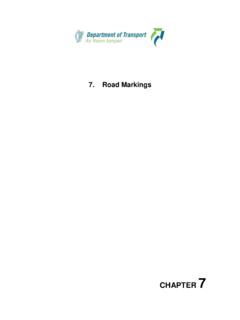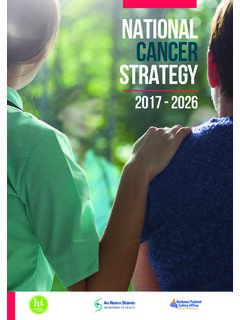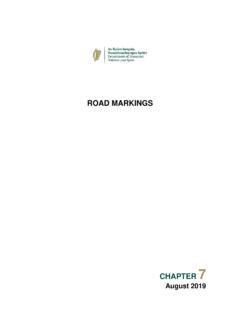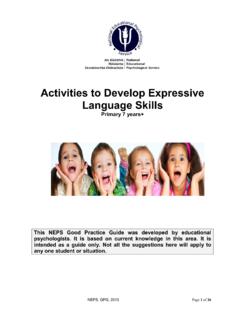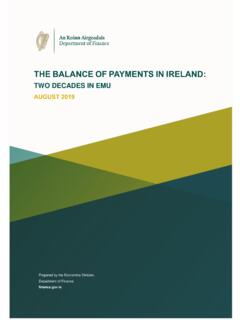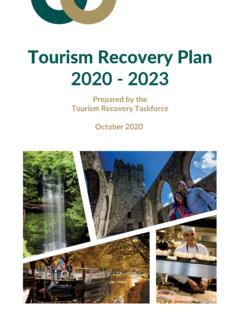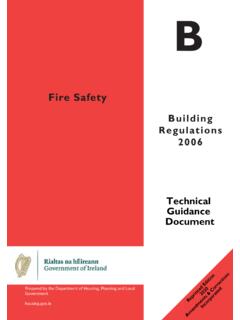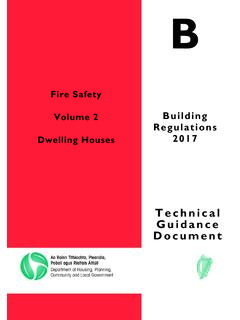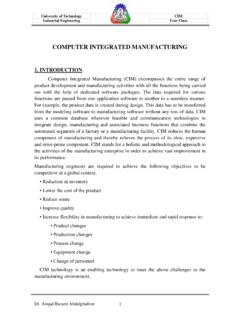Transcription of ICT in Schools
1 ICT in SchoolsPROMOTING THE QUALITY OF LEARNINGI nspectorate Evaluation StudiesINSPECTORATEPROMOTING THE QUALITY OF LEARNINGINSPECTORATEICT in SchoolsThis report, from the Inspectorate of the Department of Education and Science, presents thefindings of a major evaluation of the impact of ICT on teaching and learning in both primary andpost-primary Schools in Ireland. Although very substantial investments have been made in ICT inschools in recent years, little national research evidence has been published on the impact that thenew technologies have had on Schools and especially on teaching and learning. This evaluation setout to establish the extent to which ICT was used in Schools at both primary and post-primary levelsand, more importantly, to assess the impact that ICT had on teaching and learning, including theways in which ICT was used to support the learning of students with special educational needs.
2 Thefindings are based mainly on observations made by inspectors on visits to over 180 Schools and onthe outcomes of detailed case studies conducted by inspectors in over 50 other was also collected using a national survey of principals and teachers and a studentquestionnaire. The evaluation shows that while much progress has been achieved in the roll-out of ICT in Schools ,considerable challenges remain. The report presents findings and recommendations that will be ofinterest to teachers, principals, school support services, curriculum developers and Evaluation StudiesInspectorate Evaluation Studiespresent the outcomes of focused and thematic evaluations ofaspects of the educational system carried out by the Inspectorate, which has statutoryresponsibilities for the evaluation of Schools at primary and second level in Ireland. The reportsin the series focus on practice in Schools and are intended to disseminate good practice andpolicy advice based on evaluation outcomes.
3 Evaluation Support and Research UnitInspectorateDepartment of Education and ScienceMarlborough StreetDublin 1 Ireland 20 ISBN-0-0000-0000-XICT in SchoolsInspectorate Evaluation StudiesPROMOTING THE QUALITY OF LEARNINGINSPECTORATEICT in SchoolsInspectorate Evaluation StudiesThe Inspectorate wishes to thank the following for the use of photographs: Clonakilty Community College, Clonakilty, Co CorkSaint Mark s Community school , Tallaght, Dublin 24 Saint Mac Dara s Community College, Templeogue, Dublin 6 WScoil Barra Naofa, Monkstown, CorkScoil Nano Nagle and Talbot Senior National school , Clondalkin, Dublin 22 Whitechurch National school , Whitechurch Road, Dublin 16 2008 Department of Education and ScienceISBN-0-0000-0000-XDesigned by Slick Fish design , DublinPrinted by Brunswick Press, DublinPublished byEvaluation Support and Research UnitInspectorate Department of Education and ScienceMarlborough StreetDublin 1To be purchased directly from Government Publications Sales OfficeSun Alliance HouseMolesworth StreetDublin 2or by post fromGovernment PublicationsPostal Trade SectionUnit 20 Lakeside Retail ParkClaremorrisCo Mayo 20 ICT in SchoolsiiiContentsForewordxiExecutive summaryxiiiPart 1 IntroductionChapter 1 ICT in primary and post-primary education in policy and investment in for ICT in in the in ICT in infrastructure census in Schools (2005) in ICT equipment in on ICT and technical areas covered in the 2 Evaluation to evaluating ICT in and aims of the survey of primary and post-primary principals and sampling research of respondents and school during classroom inspections (primary)
4 And subject inspections (post-primary) outputs and and senior terms used in this report30 Part 2 ICT infrastructure and planning in schoolsChapter 3 ICT infrastructure in primary and post-primary ICT advisory and maintenance, technical support, and to by by use of computers in of ICT facilities in case-study primary of ICT facilities in case-study post-primary of The on-line The learning The school web Summary of findings and Main Recommendations66 Chapter 4 ICT planning in primary and post-primary planning ICT steering ICT ICT acceptable-use of ICT professional ICT in classroom and lesson planning and for using ICT in teaching and priorities for ICT priorities for ICT and in SchoolsivPart 3 ICT and teaching and learning in schoolsChapter 5 ICT and teaching and learning in primary ICT qualifications and practice and of ICT of ICT of ICT of resources and applications in the of for students with special educational needs by mainstream class in special to for the use of of ICT of ICT of resources and
5 Of ICT in the that constrain the development of ICT in the that facilitate the development of ICT in the and 6 ICT and teaching and learning in post-primary qualifications and ICT qualifications and skill ICT skill ICT of dedicated ICT and content of dedicated ICT practice and principals support for the use of ICT in the in practice in the of and special educational ICT in the that constrain the development of ICT in the that facilitate the development of ICT in the and 4 Summary of findings and recommendationsChapter 7 Main findings and in teaching and recommendations for policy-makers and policy development needs of recommendations for infrastructure in for ICT in in teaching and learning191 References194 Appendix197 ICT in SchoolsviAbbreviationsAPassistant principalAUPacceptable use policyBOMboard of managementCADcomputer- aided designCEBC ommercial Examining BoardCESIC omputer Studies Society of IrelandCPDcontinuing professional developmentDESD epartment of Education and ScienceECDLE uropean computer Driving LicenceEGFSNE xpert Group on Future Skills NeedsERNISTE uropean Research Network for ICT in Schools of TomorrowESIE ducation Services Interactive (Project)EUEuropean Union FETACF urther Education and Training Awards CouncilICDin-career developmentICTinformation and communications technologyISCI nformation Society CommissionLCLeaving Certificate (Established)
6 LCAL eaving Certificate AppliedLCVPL eaving Certificate Vocational ProgrammeLSRT learning-support resource teacherMLEmanaged learning environment NCCN ational Competitiveness Council NCCAN ational Council for Curriculum and AssessmentNCTEN ational Centre for Technology in EducationNPADCN ational Policy Advisory and Development CommitteeOECDO rganisation for Economic Co-operation and DevelopmentPCSPP rimary Curriculum Support ProgrammePISAP rogramme for International Student AssessmentSCRstudent- computer ratioSDPschool development planningSDPIS chool Development Planning Initiative (Post-primary)SDPSS chool Development Planning Support (Primary)SDTspecial-duties teacherSESES ocial, Environmental and Scientific EducationSESSS pecial Education Support ServiceSIPS chools Integration ProjectTIFT elecommunications and Internet FederationVECV ocational Education CommitteeVLEvirtual learning environmentWSEwhole- school evaluationviiviiiICT in SchoolsTablesTable of ICT in education policy initiatives12 Table ratio (SCR)
7 In each school sector in given years13 Table of Schools having at least one fixed and one mobile data projector14 Table of survey sample and population, primary schools24 Table of survey sample and population, post-primary schools25 Table and level of lessons observed, post-primary schools29 Table terms used in the report30 Table and use of NCTE and ICT advisory services among teachers36 Table attendance at NCTE and ICT advisory service training courses83 Table development preferences of post-primary teachers, by subject88 Table use of internet resources in planning and preparation for teaching93 Table principals views on the strategic development of ICT100 Table principals views on the strategic development of ICT100 Table priority areas for the development of ICT102 Table of primary teachers who rated their proficiency in ICT skills as either intermediate or advanced 109 Table of primary teachers who rated their ability in each of three ICT tasksthat facilitate teaching and learning as either intermediate or advanced 111 Table observations on the use of ICT to facilitate teaching and learning inclassrooms113 Table use of software and the internet to facilitate learning117 Table frequently used applications in the teaching of individual curricular areas117 Table comments on the quality of use of ICT observed in teaching and learning
8 123 Table used by members of special-education support teams to promote thedevelopment of skills130 Table frequently used applications to promote the development of individuallearning priority areas131 Table of inspectors ratings of the quality of ICT provision in supportingchildren with special educational needs in mainstream and special-educationsupport settings132 Table of inspectors comments on the quality of ICT use in special-educationsupport settings133 Table of post-primary teachers who rated their proficiency in ICT skills aseither intermediate or advanced 142 Table of post-primary teachers who rated their ability in each of three ICTtasks that facilitate teaching and learning as either intermediate or advanced 144 Table dedicated ICT lessons in post-primary schools149ixTable taught topics in dedicated ICT lessons151 Table descriptions of how ICT is used in some subjects153 Table views on the impact of ICT on teaching and learning154 Table of lessons observed during subject inspections155 Table resources available in the classrooms of lessons observed155 Table of the internet and software in teaching and learning161 DiagramsFig.
9 Response rates23 Fig. lesson observations in primary schools28 Fig. reviewed at post-primary level29 Fig. ratings of NCTE and ICT advisory services34 Fig. to computers by primary teachers41 Fig. to computers by post-primary teachers42 Fig. to computers by fifth-class students43 Fig. to computers by fifth-year students44 Fig. of use of ICT peripherals by primary teachers54 Fig. of use of ICT peripherals by post-primary teachers54 Fig. and use of e-mail address by subject taught, post-primary schools58 Fig. primary school web site: teachers responses62 Fig. post-primary school web site: teachers responses62 Fig. of ICT plans, primary schools77 Fig. of ICT plans, post-primary schools77 Fig. ICT training in primary Schools within the previous three years81 Fig. ICT training in post-primary Schools within the previous three years82 Fig.
10 And teachers views on ICT training requirements, primary schools86 Fig. and teachers views on ICT training requirements, post-primary schools87 Fig. of computers for lesson preparation90 Fig. provided by mainstream primary teachers using ICT91 Fig. of the internet in planning and preparation for teaching, by subject93 Fig. visits by teachers94 Fig. most popular sections of Scoilnet among teachers95 Fig. ratings of Scoilnet96 Fig. views on what Scoilnet should contain97 Fig. and related proficiency of applications in teaching110 Fig. to which mainstream teachers plan for the use of ICT112 Fig. of teaching and learning during use of ICT113 Fig. of ICT use to promote learning in curricular areas114 Fig. of ICT use among mainstream and special class teachers to facilitate development of skills115 Fig. of use of individual internet resources by internet users119 Fig.
